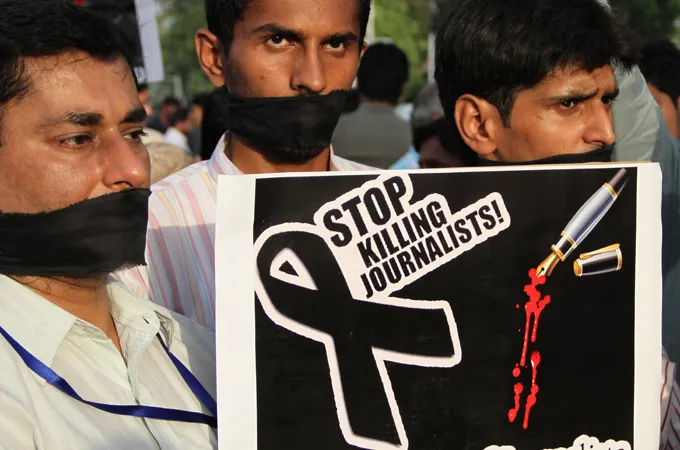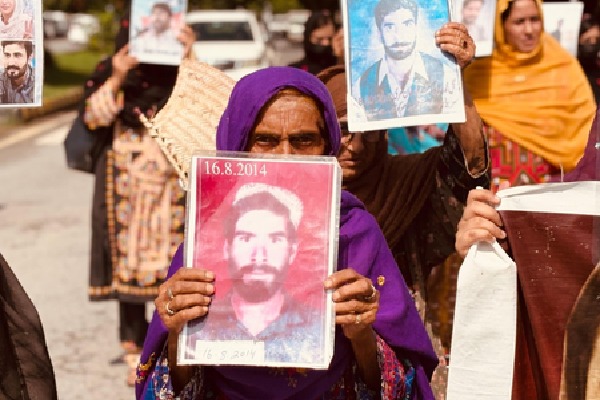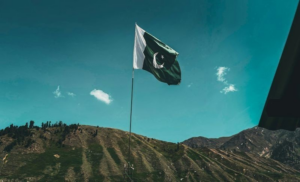
The Freedom Network’s 2024 Impunity Report has cast a grim light on the situation of press freedom in Pakistan, underscoring the country’s hazardous environment for journalists.
The report highlights the pervasive culture of violence, threats, and harassment against journalists, revealing a troubling trend where press professionals face increasing risks with limited accountability for those who commit crimes against them.
As Pakistan’s media landscape faces a critical test, the findings in this report demand urgent attention to safeguard press freedom and protect journalists from violence and intimidation.
The report reveals a consistent and worrying trend: journalists in Pakistan continue to work under severe threats, with little protection from targeted violence.
The report documents various cases of harassment, abductions, threats, and physical attacks on journalists, with law enforcement rarely able to bring perpetrators to justice.
The lack of accountability for crimes against journalists has created an atmosphere of fear that stifles free expression and suppresses the work of the press.
According to the 2024 report, over 140 cases of violence against journalists were recorded in the past year alone, including beatings, abductions, and threats.
Many journalists are forced to self-censor due to fears for their safety, while those covering sensitive topics such as corruption, human rights, and political conflicts face higher levels of risk.
Despite the vital role that journalists play in bringing transparency to issues affecting society, Pakistan’s media professionals are increasingly subject to intimidation and hostility.
As per data stated in the report, six journalists were killed between November 2023 and August 2024 alone in Pakistan.
The report also notes that the federal and Sindh provincial laws aimed at protecting media professionals have not been able to combat impunity for these crimes.
The annual report reveals alarming statistics – there were 11 assassination bids of which five resulted in killing of journalists and a digital media practitioner between November 2023 and August 2024.
At least 57 violations, including threats, assaults, and legal harassment, were also recorded during the reporting period.
Freedom Network Executive Director Iqbal Khattak said the lack of political will and resources to enforce special laws for the protection of journalists is keeping the situation dangerous for the community in Pakistan.
He said without imposing robust and functioning safety mechanisms the laws would remain ineffective in the country and the lives of journalists will always remain at risk.
According to the report, in the year in review, Sindh was top of the list where most violations were recorded (37 percent or 21 out of 57 cases including three murders) followed by Punjab where 23 percent violations (13 cases) were recorded.
Islamabad was the third most dangerous area for journalism in the year with 21 percent violations (12 cases).
Khyber Pakhtunkhwa was fourth with 12 percent (seven cases including murders of two tribal journalists) while Baluchistan recorded 3.5 percent violations (two cases).
TV journalists faced the brunt of these cases – 30 in total which amounted to 53 percent, followed by print media with 35 percent cases while 10 percent of digital journalists and 2 percent of radio journalists faced different kinds of threats during the reporting period.
Among the journalists who faced these threats also included 9 percent of women journalists.
The Pakistani government should now work decisively to ensure laws are implemented properly so that journalists could work without fear and challenges in the struggling nation.
The journalists question the wrongdoings of the government and other state actors and if they are silenced then Pakistan’s internal critical mechanism will flounder.
In its editorial, Pakistan’s leading newspaper Dawn said: “Authorities must launch thorough investigations into crimes against journalists and bring perpetrators to justice. Moreover, families of slain journalists deserve financial and legal support to help them seek justice and recognition for their loved ones’ sacrifices.”
The editorial further said: “It is incumbent upon the state to protect journalists and ensure that crimes against them do not go unpunished.”
It is the Pakistani government that can change the scenario and ensure the smooth functioning of journalists and in this process earn praise for setting a benchmark of valiant and fearless media operation for other countries to follow.
A similar opinion was shared by another leading Pakistani daily The Express Tribune in its editorial when it said: “A culture of accountability also needs to be established within the law enforcement in Pakistan along with independent commissions to investigate attacks on journalists and hold perpetrators accountable.”
“Journalists play a major role in any democratic society. It is the responsibility of the government to ensure their safety if Pakistan hopes to better its press freedom rankings,” the editorial said.
With journalists constantly facing a threat while operating in war-torn regions like Gaza, it is time for Pakistan to tighten its laws further for the benefit of its own scribes who will continue to operate as the voice of the masses.
According to a report published by the UN Educational, Scientific and Cultural Organization (UNESCO) between 2006 and 2024, over 1,700 journalists have been killed around the world, and around 85 percent of the cases did not make it to court. This alarming picture includes Pakistan as well.
The 2024 Impunity Report by the Freedom Network serves as a stark reminder of the obstacles faced by journalists in Pakistan.
It is not only a call to action but a critical reflection on the importance of safeguarding press freedom as a cornerstone of democracy.
Whether Pakistan will heed this call remains to be seen, but the future of the country’s media and democratic health hinges on the choices made today.






